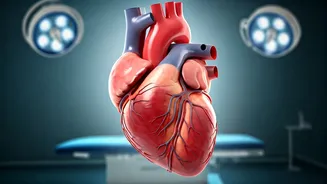What Heart Rate Means
Heart rate, or pulse, is the number of times your heart beats per minute. It acts as a vital sign, giving insights into your overall health. The heart rate reflects
how effectively your heart is working and how well oxygen is being delivered to your body. Factors like age, activity level, and overall health status influence what's considered a normal heart rate. It provides a quick way to monitor your cardiovascular health and note any changes that might require attention. Consistent monitoring and understanding of your heart rate can empower you to proactively manage your well-being. It's a simple yet powerful tool for understanding your body's response to various stimuli and detecting potential health concerns early on.
Ideal Heart Rate Range
An ideal heart rate range isn't uniform; it's specific to each individual. Generally, for adults, a resting heart rate between 60 to 100 beats per minute (bpm) is considered normal. However, athletes or those who are physically active often have lower resting heart rates. The ideal range may also differ depending on age, with younger individuals possibly having slightly higher heart rates. It's important to understand your own baseline and any patterns. Factors like stress, medications, and underlying health conditions can affect your heart rate. Regular check-ups with your doctor can help you establish your personal optimal range. This personalized approach to monitoring ensures the most accurate view of your cardiovascular health, allowing for proactive health management.
How To Check It
Taking your heart rate is a simple process you can easily do at home. The most common method involves locating your pulse, typically at your wrist (radial artery) or neck (carotid artery). Gently place your index and middle fingers on your pulse point, feeling for the beat. Once you feel the pulse, count the number of beats for 60 seconds (or for 30 seconds and multiply by 2). This calculation gives you your heart rate in beats per minute. Various wearable devices like smartwatches or fitness trackers also make this process easy. If you notice any irregularities, or concerning changes, it's wise to measure your heart rate several times throughout the day, and report any concerns to your physician for further assessment and insights to your cardiac well-being.
Factors That Influence
Several factors can influence your heart rate. Physical activity is a major one, as it raises your heart rate to supply more oxygen to your muscles. Stress and anxiety can also cause your heart rate to increase. Certain medications, such as stimulants, can elevate your heart rate. Age plays a role, with heart rates often changing as you get older. Other factors include caffeine and nicotine, which can also temporarily elevate heart rate. Medical conditions, such as thyroid issues or heart disease, can also affect your heart rate. Understanding these influencing factors can help you interpret your heart rate readings. Being aware of the interplay between lifestyle choices and your heart rate allows for more informed health decisions and proactive management of your cardiovascular health.
Beyond Exercise
Heart rate is influenced by multiple aspects beyond just physical exercise. Stress, both mental and emotional, can cause your heart rate to spike, as the body prepares for a fight-or-flight response. The substances like caffeine and nicotine can also have a temporary effect on heart rate. Body temperature plays a role; higher temperatures can increase heart rate. Medical conditions, like anemia or thyroid disorders, can impact heart rate. Even your body position, such as sitting or standing, can cause slight variations. By considering these additional factors, you gain a more complete understanding of your cardiovascular health. Recognizing these influences helps you to better manage your overall well-being and make informed choices to support heart health.
When to See a Doctor
While it's important to monitor your heart rate, there are times you should consult a doctor. If your resting heart rate is consistently above 100 bpm (tachycardia) or below 60 bpm (bradycardia), especially if you're not an athlete, seek medical advice. Additionally, if you experience symptoms like chest pain, dizziness, lightheadedness, or shortness of breath accompanied by changes in your heart rate, this indicates an immediate health concern. Irregular heartbeats, such as a skipping or racing pulse, also warrant medical attention. These symptoms could point to underlying cardiovascular issues that need prompt diagnosis and treatment. Early intervention is key, so don’t hesitate to contact a healthcare professional to address any concerns. Regular medical check-ups and open communication about any heart rate changes can help ensure the ongoing health and well-being of your cardiovascular system.













